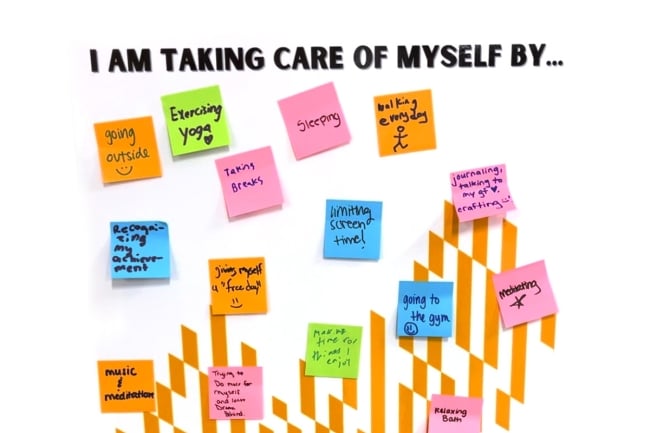You have /5 articles left.
Sign up for a free account or log in.

A poster board displayed during a tabling campaign by Towson University’s counseling center showed how students are trying to ease their stress amid election season.
Photo illustration by Justin Morrison/Inside Higher Ed | Sarah Marek/Towson University
“Limiting screen time.”
“Walking every day.”
“Trying to do more for myself and leave the drama behind.”
Those are some of the ways students at Towson University, a public university north of Baltimore, said they were taking care of their mental health in the run-up to the 2024 election. The responses were fielded as part of a tabling effort, co-sponsored by the university’s counseling center and its Office of Civic Engagement and Social Responsibility (OCESR), designed to help Towson students manage their emotions as Election Day approached. The effort began approximately two weeks ago and will continue into the coming weeks.
“The idea was to give students a space to reflect on the ways they’re taking care of themselves right now,” said Sarah Marek, an outreach, prevention and education specialist for the counseling center. “Quite a few folks have mentioned going outside, taking breaks or giving themselves the day off, [and] different forms of moving their body.”
The tabling campaign also serves as a place for students to learn more about voting; OCESR student employees have been posted alongside counseling center staff to answer questions about how to register to vote, request mail-in ballots and more.
Election anxiety, predictably, has been high nationwide leading up to Election Day. In the American Psychological Association’s latest Stress in America survey, conducted in August, 69 percent of respondents specifically named the election as a significant source of their stress, while 77 percent said they were stressed about the future of the nation.
Those feelings can be especially intense among first-time voters, who in prior years may not have paid much attention to politics, experts say. That’s why many universities are creating new initiatives in an attempt to support student mental well-being—or at least distract them from the urge to catastrophize. Other events focus less on relaxing and more on trying to foster open and respectful discussions about the election’s results, such as a “Restorative Dialogue Across Differences” scheduled for Wednesday at Virginia Tech.
Lego Sets and Cookies
Some conservatives have criticized the trend as coddling college students, saying that such events, which often feature stereotypically childlike activities like arts and crafts, are akin to infantilization. They argue that students should be capable of managing their own anxieties during stressful times.
“Folks, this isn’t funny anymore. It’s disturbing to treat adults like fragile children,” wrote Robert Pondiscio, a senior fellow at the conservative American Enterprise Institute, in a post on X about a self-care event reportedly scheduled at one Washington, D.C., university that is slated to include building with Lego blocks and eating cookies.
Kelly Brown, the director of counseling, health and wellness services at the University of Puget Sound in Washington—where a slate of more than a dozen election-related wellness events was planned for the days surrounding the election—disagrees with the idea that such events infantilize students.
“I do think the rhetoric that goes around [during] the elections, with the past few election cycles, is really different from what I grew up with … we’re constantly hearing messages that are ‘If you don’t do it this way, everything is over,’” said Brown. “I don’t think of it as coddling. I think of it as paying attention to the environment around us.”
Among the events planned in the coming days at the university: a space to “recharge” and participate in crafts, like decorating canvas bags, on Tuesday; a “Pause for Paws” event where students can drink hot chocolate and spend time with “furry friends” on Wednesday; and a Thursday “Postelection Processing Space” that will feature a baked potato bar and time to talk about where the results stand so far.
Brown predicted the latter event may end up being the most popular, based on students’ well-established love of free food. At the same time, she acknowledged that there’s a chance no one will turn out to these gatherings.
“That’s OK, too,” she said. “At least we were prepared in case they need them.”
Self-care has even made its way into Election Night festivities; Towson is providing a dedicated “relaxation zone” during an OCESR and Student Government Associated–sponsored watch party, where those who need a break from the results can color, eat snacks, drink tea and even participate in guided meditation sessions led by a counseling center staff member.
“The night of the election, we anticipate there will be some heightened stress, heightened anxiety, because for a lot of students, this is the first time that they were participating in the election. And given that [in 2020] it was during COVID … even if it is the second time for students to participate, it’s a different kind of election experience,” said Romy Hübler, the director of the OCESR. “So, we wanted to make sure that there is a space where you can retreat.”




